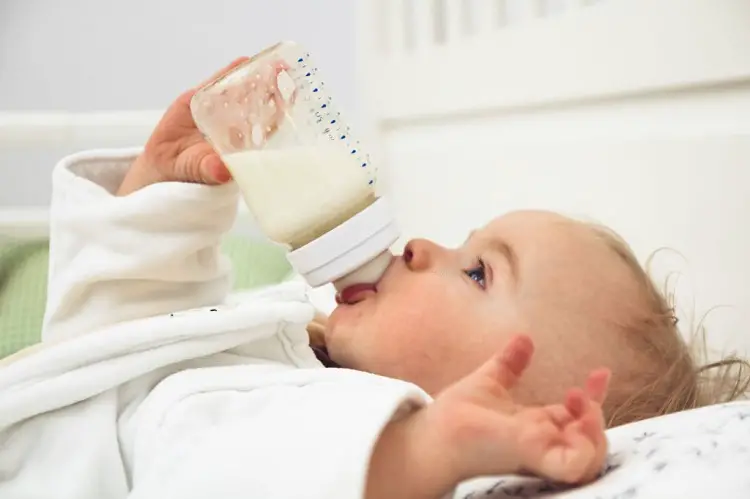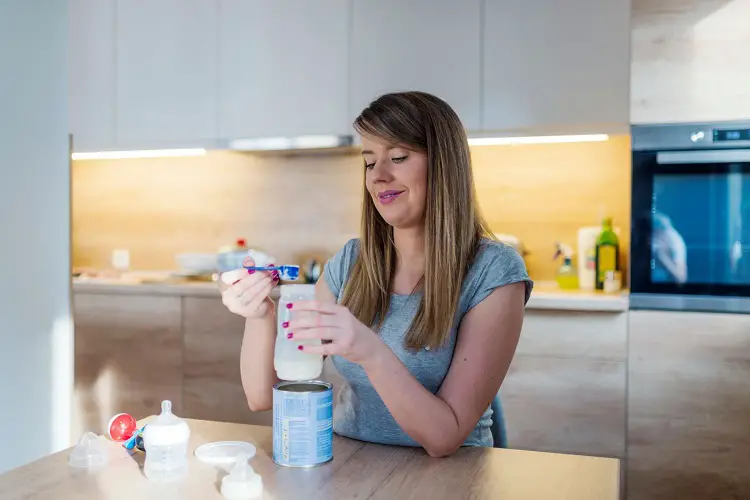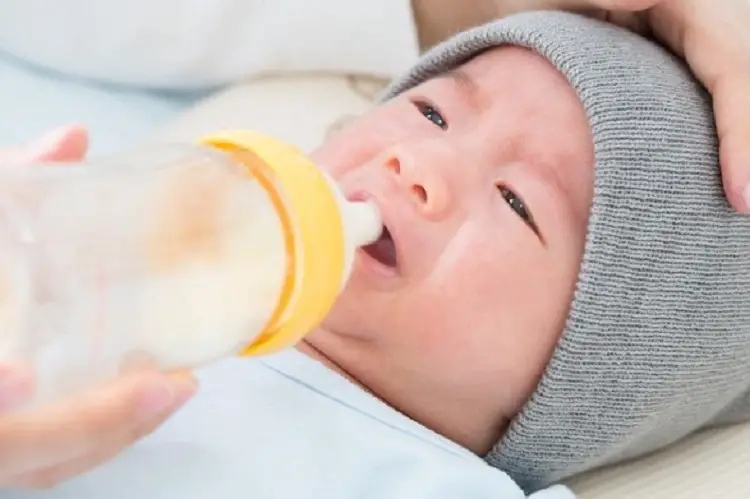Are you wondering what happens if baby drinks spoiled formula milk?
You wake up late in the night to prepare a formula feed to give your baby, you are still half-asleep, and you feel like something is not right.
Sniffing the feeding bottle, you realize your baby has been drinking spoiled milk. Panic sets in.
The truth is nothing serious will happen when a baby drinks spoiled formula.
However, since all babies are different, some may experience symptoms like vomiting, diarrhea, weakness, fever, stomach cramps, fussiness, abdominal swelling, and poor appetite.
So what do you do in situations like this? Worry not! Everything is going to be alright. No one is above mistakes, after all.
We will discuss what happens if baby drinks spoiled formula milk, what you can do if your baby drinks spoiled milk, and practical ways to prevent feeding your baby spoiled formula milk. We’ve got you covered!
What is Old Formula?
According to a report by pediatricians and mothers worldwide, any formula milk fed to the baby after about 2 hours of its preparation is considered old or spoiled. There are two reasons behind this theory.
Firstly, when a formula is left open for a long time, it gets spoiled because of a bacteria known as Enterobacter sakazakii.
This naturally occurring bacteria settles in dry food such as herbs, powdered milk, and baby formula.
Many studies have been conducted in the Department of Infant Health to prove that these bacteria are very dangerous and can turn fatal for newborns with existing medical conditions whose immune systems haven’t been fully developed.
What Happens If Baby Drinks Spoiled Formula Milk?

Following proper breast milk handling and storage guidelines rarely will spoil formula milk.
Although, occasionally, this can happen, and generally, the result will be vomiting up the spoiled milk and diarrhea.
Vomiting
After your baby drinks spoiled formula milk, you’ll first notice vomiting and diarrhea.
Vomiting is a means through which your baby’s system tries to eliminate spoilt food. Some babies may develop a fever after vomiting, while others may settle and recover.
Diarrhea
If your baby drinks spoiled formula milk, her body will want to detoxify itself through Diarrhea. The Baby’s system passes the spoilt food differently than vomiting.
Both these processes cause weakness and dehydration in your baby and can affect her feeding pattern.
You must note how frequently your baby vomits and give him some water to rehydrate or see a doctor immediately.
Dehydration
If your baby falls ill and experiences diarrhea, they risk becoming dehydrated. They are likely dehydrated if they stop having wet diapers, seem sluggish, and run a fever.
Your baby may be in an emergency if they continue to vomit after you have provided fluids, and you must seek medical assistance as soon as possible.
Fever
You should consult your doctor immediately if your baby develops a fever after drinking old formula. Your baby’s immune system will be trying to fight the bad bacteria.
Your baby may also exhibit weakness, stomach cramps, fussiness, abdominal swelling, and poor appetite after drinking a formula that has sat outside for a long time.
How To Know If Formula Has Gone Bad?
If you do not know whether or not your baby’s formula has expired, it’s best advised to err on the side of caution.
If you feel it’s getting old or spoiled, avoid feeding it to your baby and throw it out at once!
When serving your baby formula, you must practice good hygiene to prevent foodborne diseases. Always wash and dry your hands before preparing your baby’s milk.
Also, make sure to look out for signs of milk spoilage. When the formula starts to go bad, you should notice:
- The smell will have an off aroma
- Clumping
- Separation of ingredients in the formula
- Your baby might refuse feeding through her bottle or get sick after feeding
Read Also: What Happens If Baby Drinks Hot Formula
Why Does Baby Formula Go Bad After An Hour?
Although it is best to give your baby formula as soon as it is prepared.
Many parents give their babies their formula sometime after it has been mixed, which is the safest and most effective way to feed them.
After an hour, the baby formula does not immediately turn bad, but bacteria grow, and the feed becomes more dangerous as time passes.
If a bottle of baby formula is left at room temperature for an hour without being touched, it may go bad as it must be stored in the fridge for 24 hours.
Moreover, if your baby has drunk some bottles, you should keep the remaining formula for two hours.
The spoiled milk and your baby’s saliva can cause harmful bacteria to grow after two hours.
How long is baby formula good after it’s mixed?
According to the CDC, the formula should be consumed within two hours of mixing (or two hours after opening a bottle of liquid formula kept at room temperature).
A Formula is made with a dairy base, which can go bad if left at room temperature for more than a few hours. The longer the formula sits at room temperature, the greater the risk to your baby.
When you refrigerate a premixed bottle of formula, you slow the growth of bacteria and extend the time before the formula spoils.
A refrigerated bottle of formula (either powder-mix or liquid) can stay in the refrigerator for 24-48 hours so that you can prepare a bottle in advance for babysitters or daycare providers.
Just ensure you keep it in the refrigerator.
How Long After Drinking Spoiled Milk Will Baby Fall Sick?
Babies often experience nausea on the first to the second day after eating contaminated food with a spoiled chemical.
Milk left at room temperature or allowed to sit in direct sunlight usually results from bacterial toxins in their rancid flesh.
If you accidentally fed your baby spoiled formula, your baby may likely experience vomiting, diarrhea, and fever. All these symptoms are likely to occur for one to two days.
What To Do If You Feed Your Baby Old Formula?
We all make parenting mistakes sometimes, so don’t punish yourself harshly if you accidentally give your baby formula after two hours or if your formula has expired.
Here are practical things you need to do if your baby drinks old formula by accident:
Stay calm
Try to remain calm and take a breath unless your baby seems extremely ill. This will be a parenting mistake that teaches you a valuable lesson.
You will likely become more vigilant when it comes to your baby’s feeds, and that is not a bad thing.
Relax, you are not the first mom to feed her baby formula, and you won’t be the last.
Watch your baby closely
Keep a close eye on your baby if they start vomiting or having diarrhea. Monitor how often they are vomiting and if it persists, seek medical assistance.
It is also important to note your baby’s temperature. A fever can be dangerous for young children. If your child has a persistent high temperature, you should seek help immediately.
When your baby vomits and has diarrhea, their body is trying to flush out the germs and bacteria from the food poisoning.
This is normal but can be serious if it continues for a long time.
Keep your baby hydrated
When your baby is sick, or diarrhea can cause dehydration, you must replenish the fluids they are losing by offering them drinks regularly.
If you are unsure what drinks to provide them, seek medical advice.
Dehydration can pose significant health risks, and if your baby is becoming increasingly unwell, you need to see a doctor.
Discard all the old formula and expired formulas away
It is fine to make a mistake, but now you must ensure that it does not happen again. If you have a large tub of expired formula in your cupboard, it should be thrown out.
Yes, baby formula is expensive, and throwing it away is heartbreaking, but your baby’s health is the most important thing.
Label your prepared bottles if you store them in the refrigerator in the future, and keep track of the time you prepare feeds and your baby starts their bottle, so you always know if the bottle you left out on the side is safe to drink or not.
What Happens If Baby Drinks Spoiled Formula Milk: 5 Tips To Prevent Infections
Parenting is simply an art. If your baby is under two years old, you must be very watchful because this is when she is growing up, and her immune system won’t be as strong as you would want it to be.
The best way to keep your child healthy and happy isn’t by suddenly switching from formula feeding to breastfeeding but by taking the right measures regardless of your feeding method.
Measures that may help include:
1. Sanitize Everything Used In Preparation And Storage
It isn’t much you can do about the bacteria because it occurs naturally and settles on surfaces. However, maintaining proper hygiene helps to prevent contamination of your baby’s food.
Sanitize every feeding parts you use to prepare and store your baby’s meals. Also, sanitize all pump parts before and after use if you pump breast milk.
2. Try Using The Liquid Formula
Enterobacter Sakazakii, a naturally occurring bacteria that settles in dry food, seems to adhere to powdered products more than liquids.
This indicates that liquid formula milk reduces your baby’s chance of getting infected by the bacteria.
However, the liquid formula must be kept according to the manufacturer’s guidelines and tightly sealed.
3. Don’t Warm In The Microwave
Warming your baby’s formula before feeding is unnecessary. However, microwaving is not your best idea if you intend to warm the milk formula or bottle.
This method does not warm food evenly, which leads to different patches of temperature variation throughout the meal, which can encourage bacterial growth.
4. Take Precautions During the Preparation And Storage Of Formula
Ensure the formula milk lid is properly sealed in storage and cover the lid immediately after scooping what you need to prepare a meal.
Also, the water you use to prepare the formula must be clean, boiled, and cooled before use.
Always feed your baby within two hours of preparing the formula milk and throw away the leftovers immediately.
5. Make Sure Your Hands Are Clean!
Remember to wash your hands with mild soap and water immediately after using the toilet or changing your baby’s diapers.
Make sure you wash your hands before preparing the formula or making contact with anything that will touch your baby’s mouth, like the feeding bottles and pacifiers.
Read: Why is My Baby Formula So Foamy? Explained
5 Practical Ways To Help Prevent Your Baby From Drinking Old Formula

1. Always Label Your Formula
To prevent your baby from drinking old formula, label the formula bottles. Just like you would with expressed breast milk, write the date and time at which the formula was prepared.
This keeps your partner or caregiver updated on which one to use first to prevent infections and wastage.
This trick guides your caregivers to feed your baby the older formula before the new one.
2. Discard Old Formula Immediately
Throw away any old formula immediately, as this can unknowingly prevent someone else from feeding it to your baby.
There are guidelines on how long prepared and refrigerated formula milk can last.
Studies from parenting moms and pediatricians have shown that formula milk can remain viable for twenty-four hours by maintaining the right temperature.
3. Keep The Formula Away From Contaminants
As a nursing mother, it is necessary to devise a good method for proper formula storage.
Anything that can make your baby fall sick if ingested should be kept at a distance from where you prepare the formula.
A typical example of this is an old formula. Baby’s first few months are critical to them, especially one with an existing condition, so be vigilant with whatever touches your baby’s mouth.
4. Be Observant
Formula milk can become infected even before it expires through contamination of the bottle or formula before preparation.
See the doctor immediately when your baby starts acting strange or becomes less active, accompanied by a fever or vomiting.
5. Check the expiration date
You can avoid accidentally feeding your baby old formula by quickly checking the expiration date.
Check the expiration date before purchasing any formula at the store, and double-check it before filling a bottle to be safe. You should also be aware of indications that the formula has gone bad (clumping, nasty smells, mold, etc.).
6. Avoid The Blame Game
Parenting can be rewarding and beautiful, but sometimes it can be overwhelming and exhausting.
Feeding your baby old formula can result in self-blame or blaming your partner. Unfortunately, that does not solve the problem.
Rather than blaming your partner, identify what you did wrong, seek professional counseling and direction, and work on doing better in the future.
Read Also: Best Formula To Keep Baby Fuller Longer
Other FAQs
Does Powdered Formula Always Go Bad?
A ‘Best By’ date is usually stamped on the can of powdered formula.
The expiration date refers to the point at which the nutrients in the formula begin to degrade, so technically, ‘expired’ formula is frequently still safe to eat (even if it is less nutritious for your baby).
Packaging issues can sometimes allow water or bacteria to contaminate a powdered formula.
If your powdered formula is unsafe to consume, the packaging will most likely be warped or open, the powder will have a musty or moldy smell, and you may even see mold on the powder or in the container.
It is best to trust your instincts. So, if you think the formula does not look good or smells strange, toss it away.
How Long Is Powdered Formula Good Once It Is Opened?
Most big powdered infant formula brands last about a month after opening.
Remember that if you buy an organic variety of powdered formula, the powder might go bad earlier, depending on the ingredients.
Always go through the brand of your infant formula for their recommendations, and when in doubt, discard any infant formula that’s been open for more than a month.
Can I Use Baby Formula after the Expiration Date?
You can use baby formula after the expiration date listed on the can.
As long as the formula does not appear spoiled (no clumping, mold, or odor), it should be safe for your baby.
However, the nutrients in the formula begin to degrade after the expiration date. That means that the older the can of formula, the less nutritious it is for your baby.
What To Do With Expired Baby Formula
While it may be tempting to use your expired formula, it’s recommended not to avoid putting your child’s health at risk.
If you don’t feel confident in discarding the formula because you bought it expensively, you can try to take it back to the grocery store and ask for a refund.
If your formula is still sealed, some grocery stores will let you exchange it for a new can.
Return policies often vary by store, so be sure to check your particular store’s policy and do not forget to keep any applicable receipts.
You can also donate your expired formula to an animal shelter if it isn’t too far past its shelf life and the spoilage isn’t too bad.
Another interesting option for what to do with your expired infant formula is to use it in gardening. It also works for contaminated food and has gone past its best-before date.
Can a Baby Fall Sick From Drinking Sour Milk?
There’s a good chance that your baby will not fall sick when he/she drinks spoiled milk.
If you accidentally fed your baby spoiled formula, your baby may likely experience vomiting, diarrhea, and fever but is unlikely to be hospitalized for such an issue.
Can I Feed My Baby Milk that is a Little Sour?
Yes, you can feed the milk to your baby if the milk doesn’t have an unpleasant smell or taste.
Related Posts:
- 12 Best Lactose-Free Formulas
- 6 Home Remedies for Drinking Spoiled Milk
- Best Formula For Acid Reflux and Gas
- Best Formula For Picky Breastfed Babies
- 13 Best Formulas That Taste Closest To Breast Milk
Conclusion
As parents, it is common to make mistakes. As rewarding and beautiful as feeding your baby may seem, you must know good formula milk storage recommendations and understand the variances in milk appearance, smell, and taste of fresh formula milk.
This can help prevent unnecessarily throwing out good milk.
More so, since a baby’s immune systems are weak, it’s important to take the right measure when preparing your baby’s formula because some infections can lead to death.
If there is any old formula remaining, you should throw it immediately so that you or your partner will not make the mistake of feeding it to your baby.
We hope you found this article “What Happens If Baby Drinks Spoiled Formula Milk” helpful? If you have any formula milk gone bad stories or extra tips on how to prevent milk from going bad? Let us know in the comments section.
